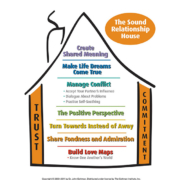How to accept influence and compromise with your partner.
The longer you are in a relationship, the more predictable and repetitive are the disagreements. One of you might be more adventurous and a risk-taker while the other needs more security and a predictable routine. One might like nothing better than large social gatherings while the other person is secretly grateful for a legitimate excuse to stay home and hibernate!
Many of my couples report that these differences are especially challenging now as public venues begin to open up. For one, it is a welcome relief, for the other, it is a major cause for concern. Having more time at home may also have highlighted the differences in taste for movies, decorating, money or beliefs about raising children.
Sometimes these disagreements become ugly as each of you refuses to budge from your own point of view and start to feel criticised or even rejected by the other. If these arguments occur often enough, you might even find yourself wishing you had chosen someone else! Surely, this relationship is not meant to be when we fight so much and are so different!
If you and your partner are feeling similar tensions, you are totally normal. John and Julie Gottman refer to these issues due to differences in personalities or lifestyle needs, as Perpetual Problems.
69% of ALL problems are Perpetual Problems.
The longitudinal Gottman research showed that couples will return time and time again to the same conflict when asked to argue in front of the cameras. The hairstyles and fashions changed but the perpetual problems remained.
Maybe this is starting to sound like those irreconcilable differences frequently cited in divorce proceedings. It does not have to go that way! In Gottman research, the Masters of Relationships showed a set of specific skills for conflict management. I have discussed these in earlier blogs.
Today, I want to describe how the Masters accept influence from each other and compromise. That means they would be willing to change some of their behaviours at the request of their partner. In heterosexual relationships, the research was very clear. If the man accepted influence from his partner, the relationship would last! If he did not accept her influence, divorce was much more likely.
The stakes are high in learning how to accept influence from your partner.
Let me illustrate this technique with my own relationship. I was rather pleased that I had purchased some activewear. They were bright colourful exercise pants for my regular walks. I was bored with standard black attire and chose colours that put a smile on my face on dreary winter mornings.
My adorable partner who is more conservative in his dress sense covered his eyes in mock horror, laughed and advised me not to wear them outside the house!! I exclaimed that response was not going to help my exercise programme at all!
That amounted to another withdrawal from the goodwill bank account. In the relationship that account is the reserves of positive feelings built up through small acts and words of kindness. In this instance, a few weeks ago my partner made disparaging comments about my choice of beautiful aqua couches for the consulting room. I spent a lot of time colour coordinating them with my business cards and the Tuned in Couples logo!
I flounced around for a bit and showed him the spare bedroom (as a veiled threat). Then I started to educate him about the beneficial impact of colour on Seasonal Affective Disorder! I also reminded him about it being my body and I can dress however I please.
Later that same day, he sent me a text in a repair attempt.

I did not believe him for a moment! There was absolutely no sincerity in his second reaction. But it made me smile. He was trying and he also said, “Of course you can wear whatever you want.”
Too right!
I have kept the exercise pants and enjoy wearing them. At the same time, I have decided not to wear them to coffee shops or on other social outings. That seems like a reasonable and fair compromise.
More recently, I watched my partner’s reaction to what I have called my Compromise Rain Jacket very carefully. It is bright and colourful to the waist and then a classic navy to the hood. We laughed about our different tastes and he said, “It is very Robyn and I like it”.
I did not use the lie detector because his response kept us both happy! I forgave him for then suggesting it might not go with the exercise pants. After all, he was probably right!
Accepting influence and building compromise needs to go both ways. If you would like help in developing compromises to manage your particular areas of disagreement, call me for an appointment. I have strategies to help you to learn these skills.
Best wishes
Robyn Blake-Mortimer
Call 0423 617 735 to schedule your free 15-minute telephone consultation about how I could help you and your relationship.










